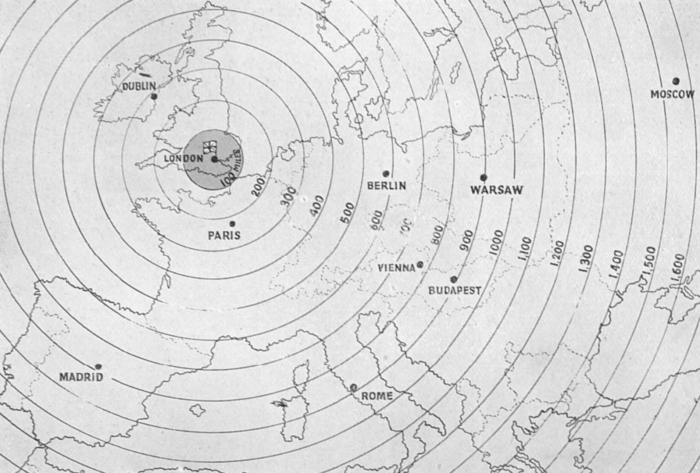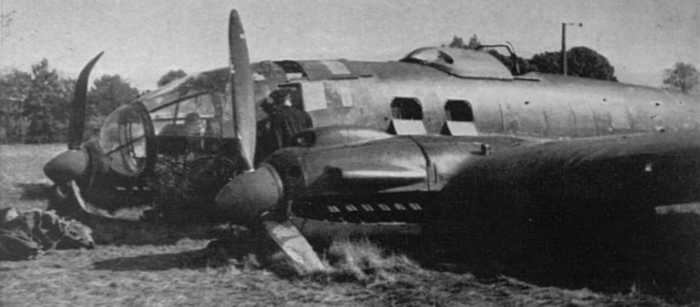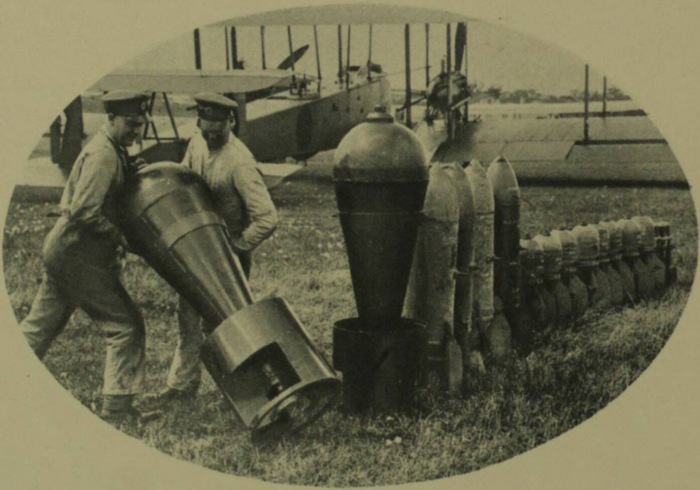
After the drama of 1934, ‘the bomber will always get through’ appears less frequently in the British Newspaper Archive (BNA) in 1935 (though still at about twice the level than in 1932 or 1933). But it is still mostly being used in a very political way. This is not surprising, with the general election contested in November to a significant extent on issues of collective security and national defence. In fact, it was most often used by the Labour Party to argue against the National Government’s rearmament policy — which must have irritated Stanley Baldwin, now prime minister again, no end.
For example, Creech Jones, Labour candidate for Shipley, asked his listeners to ‘ponder’ Baldwin’s words, ‘and remember the type of rearmament policy that the National Government is urging in this election — deliberately left vague in order that you should not realise its implications’.1 Tom Johnston, prospective candidate for West Stirlingshire, was blunter:
In a memorable speech made the House Commons 18 [sic; actually 30] months ago, Mr. Baldwin had said, ‘You cannot defend yourselves in the air, the “bomber” will always get through.’ If that were true, and we were drawn into another war by any means whatever, civilisation was finished.2
Johnston invoked Baldwin’s analysis of air defence again during the election campaign, calling him ‘perhaps the greatest living authority on the subject’.3 A slight exaggeration! The Nottingham Journal was on safer ground in pointing out that Baldwin’s authority derived from being ‘for five years the chairman the Committee for Imperial Defence’.4 This was in the context of the other main use for ‘the bomber will always get through’ in 1935: the campaign for the Peace Ballot, officially the ‘National Declaration on the League of Nations and Armaments’. This was an unofficial referendum organised by the League of Nations Union, designed to show public support for collective security and disarmament by asking a series of questions . As Henry A. Fisher of Shepherd’s Bush explained in a letter to the editor of the West London Observer,
Mr Baldwin has truly said that whatever our defences may be ‘the bomber will always get through,’ and what would it mean to the civilian population, men, women and children alike, if such a catastrophe occurred? There can be only one way out: no half-way measures will do. We must earnestly seek the universal abolition of all military and naval aircraft.5
The great majority of people who took part agreed, though by a lower margin than most of the other questions: 9.5 million to 1.7 million (a significant proportion of the total electorate: 21 million votes were cast in the general election).
For 1936 there’s no clear pattern as to when ‘the bomber will always get through’ was cited; it is scattered through the year. It’s still the default position; as The Sphere put it, ‘we have repeatedly been told by Government speakers that a proportion of attacking bombers will always get through in spite of fighters, balloon barrages, anti-aircraft guns etc’.6 And it’s still being quoted approvingly by pacifists and war resisters, Leaguers and Peace Pledgers, but now with increasing pessimism. In critiquing the Home Office’s latest ARP circular, the Manchester Guardian referred to ‘Mr Baldwin’s famous dictum, “Whatever people may tell him, the man in the street knows that the bomber will always get through”‘.7 (Though if it was so famous they might have bothered to quote it correctly.) W. S. Dawkins of Norwood Green used it in a sarcastic and rather morbid reply to another correspondent:
On the word ‘go’ in the next strafe, there will positively be no solution to the problem of evacuating the 8,000,000 [Londoners] — transport will have broken down, sanitary services and water supply smashed, power stations demolished, and whole districts ablaze from end to end, many square miles of poison gas, and streets piled high with burned, mutilated and rapidly decomposing bodies. His own Mr. Baldwin, before his lips were sealed, has said, ‘I think it is well for the man in the street to realise that no power on earth can prevent him from being bombed, whatever people may tell him, the bomber will always get through.8
The italics here are Dawkins’ (or the newspaper’s) own, which reinforces the sense that Baldwin’s claim was unanswerable, even if Baldwin’s own lips were now ‘sealed’ on the matter. R. J. Brock also used ‘the bomber will always get through’, taking part in a letter column debate:
Instead of now utilising all our available wealth in attempting to save our big cities (‘the bomber will always get through’), we would do well to concentrate upon the building up of rural civilisation. Here lies the only hope for humanity, not in States of any complexion, whether Fascist, Bolshevik, or even, alas! ‘democratic’.9
Here, though, it’s being used not with reference to the question of war or peace, but town vs country: the bomber means that the cities are dead anyway, so why bother with them? Treechange the nation-state out of existence instead.
In 1937, debate about aerial bombardmant heated up again, thanks to the wars in Spain and in China and the death of civilians under German, Italian and Japanese bombs. ‘”The bomber will always get through,”‘ wrote the Nottingham Journal‘s editor, ‘and what happens when it does is no longer the subject of speculation’.10 J. M. Gray pointed to German raids on Almeria and Guernica, and asked
Is there no escape from such stupidity? In any future war, must we destroy not only the women and children of larger cities but the irreplaceable treasures which they contain as well? It may be taken for granted that ‘the bomber will always get through,’ and that if we indulge in another war, our civilisation may very well be destroyed and leave no more traces than are to be found of former civilisations in the jungles of Ceylon and Indo-China. Is there no escape?11
Basil Ball of Lancaster suggested (again in a letter to the editor, which suggests how useful this piece of rhetoric was for debating purposes) that ‘Mr. Baldwin was certainly right when he said the bomber will always get through’, but that ‘We in England at this very moment are building a huge air fleet that will be used like Japan’s, when the word given’.12
But what’s interesting is that in 1937, for the first time in the five years since Baldwin’s speech in 1932, ‘the bomber will always get through’ is being quoted in order to question it. Not very often, admittedly, but that it’s happening at all is significant. The first I’ve found to do so in BNA is none other than the physicist Frederick Lindemann, Churchill’s scientific advisor, who in February was standing as an independent conservative in a by-election for the Oxford University seat. He campaigned specifically upon the issue of air defence:
He refuses to accept the view that the bomber will always get through and maintains that it is possible defend the coast line and prevent hostile aeroplanes reaching and wrecking cities. To press for unremitting work in the development of defence, and to see that the air rearmament effort is well directed, would be his main objectives.13
That Lindemann lost the by-election would suggest that his electorate of Oxford graduates did not want to hear that the bomber might not get through (though, to be fair, he did win a creditable 24% of votes). But he wasn’t alone. A leading article in the Northern Daily Mail noted that ‘Mr. Baldwin has told us that “the bomber will always get through,” and this sentence is often quoted by people who think it is useless to trouble about defending ourselves from aerial attack’.14 But it immediately glossed his words:
Obviously Mr. Baldwin did not mean that in the event of attack all the bombers would get through, or he would not be striving so hard for defensive measures. Probably he meant that some bombers would get through, or in other words that there is at present no known method of obtaining immunity from such attacks.15
P. R. C. Groves was then cited to the effect ‘that even an isolated bomber would seldom get through, and that enemy’s power of attack would quickly be curtailed’ by a combination of air offence and air defence (anti-aircraft guns, searchlights, balloon aprons — no mention of fighters). It’s somewhat surprising to see Groves invoked to attack the knock-out blow theory he had done so much to defend. But only somewhat. In my book I identified 1937 as ‘the high-water mark in the literature of the knock-out blow; it declined thereafter’.16 And this scepticism would likely appear earlier in the press than in books. Again, though, it’s a very small amount of scepticism; the next post will tell how big it got.
![]() This work is licensed under a Creative Commons Attribution-NonCommercial-NoDerivatives 4.0 International License.
Permissions beyond the scope of this license may be available at http://airminded.org/copyright/.
This work is licensed under a Creative Commons Attribution-NonCommercial-NoDerivatives 4.0 International License.
Permissions beyond the scope of this license may be available at http://airminded.org/copyright/.
- Shipley Times and Express, 9 November 1935, 10. [↩]
- Milngavie and Bearsden Herald (Milngavie), 31 May 1935, 1. Though Johnston rather muddied his argument by going on to say that ‘If they were drawn into another war, it never would be paid for, and that was the strongest argument against it’! Ibid. [↩]
- Kirkintilloch Herald, 6 November 1935, 6. [↩]
- Nottingham Journal, 1 February 1935, 5. [↩]
- West London Observer, 8 March 1935, 12. [↩]
- Sphere, 12 December 1936, 497. The above map ‘shows the distances from London to and from other cities, thus indicating the necessary range for bombers if a state of war should arise’, and is from ibid., 496. [↩]
- Quoted in Evening Telegraph (Dundee), 25 February 1936, 4. [↩]
- West Middlesex Gazette (Southall), 21 November 1936, 13. [↩]
- Scotsman (Edinburgh), 9 November 1936, 11. [↩]
- Nottingham Journal, 20 September 1937, 4. [↩]
- Scotsman (Edinburgh), 24 November 1937, 13. [↩]
- Lancaster Guardian, 1 October 1937, 7. [↩]
- Yorkshire Evening Post (Leeds), 12 February 1937, 11. [↩]
- Northern Daily Mail (West Hartlepool), 22 February 1937, 4. [↩]
- Ibid. [↩]
- Brett Holman, The Next War in the Air: Britain’s Fear of the Bomber, 1908-1937 (Abingdon: Routledge, 2017), 74. [↩]





